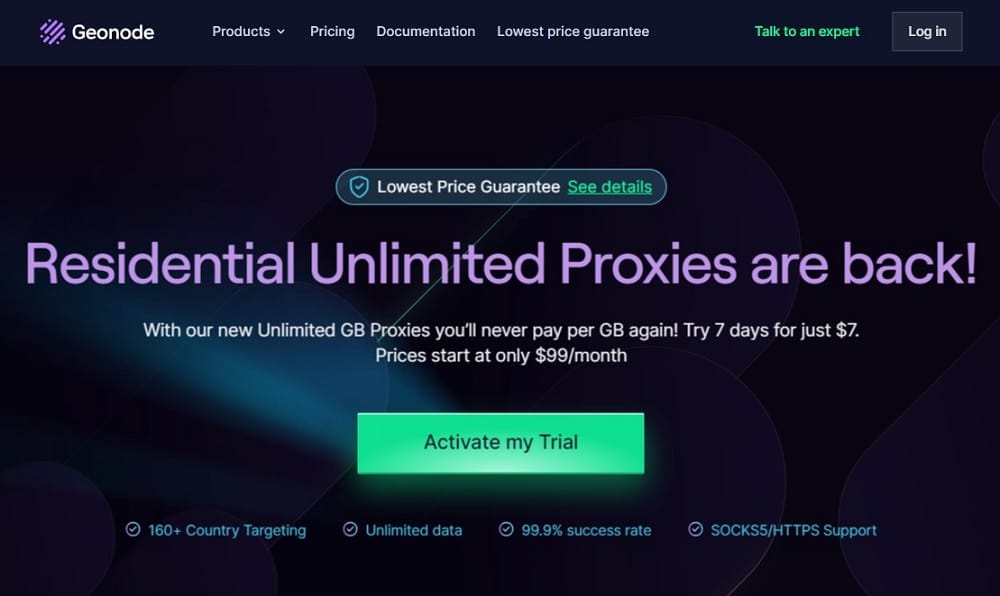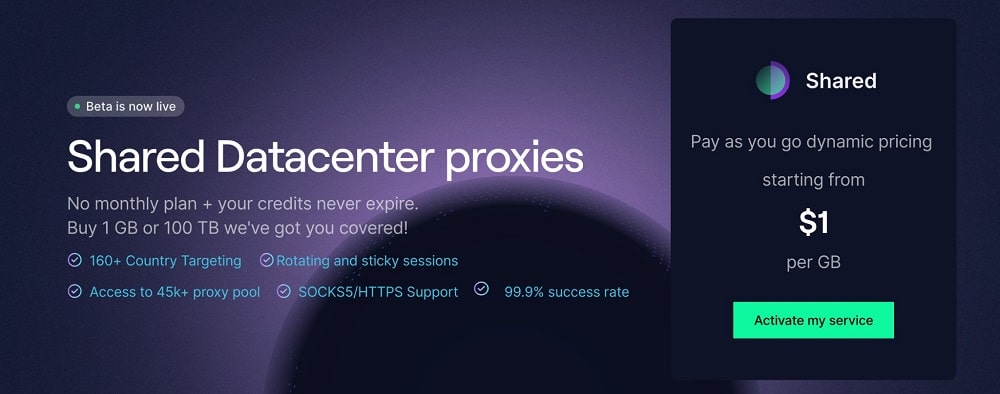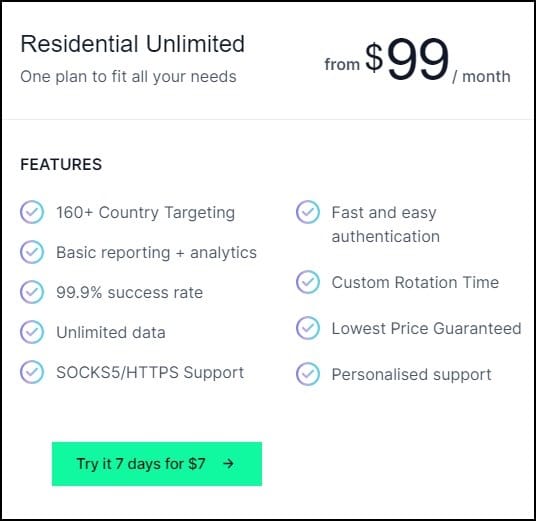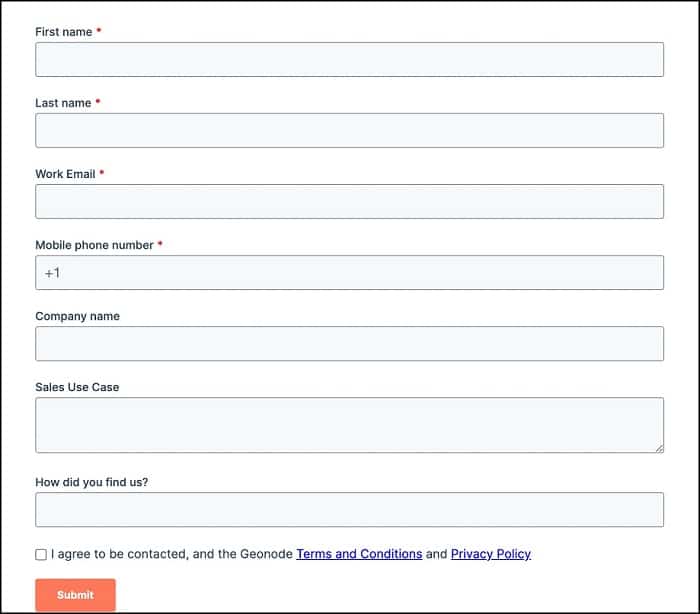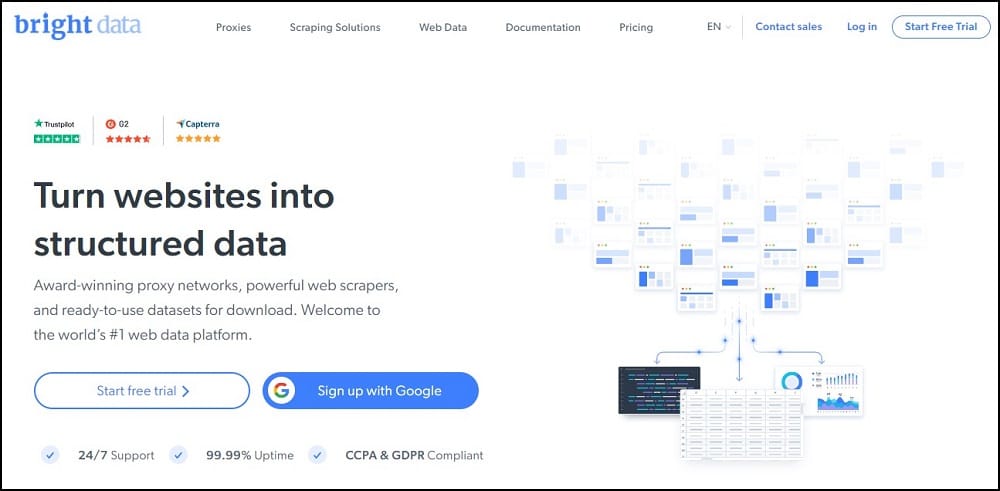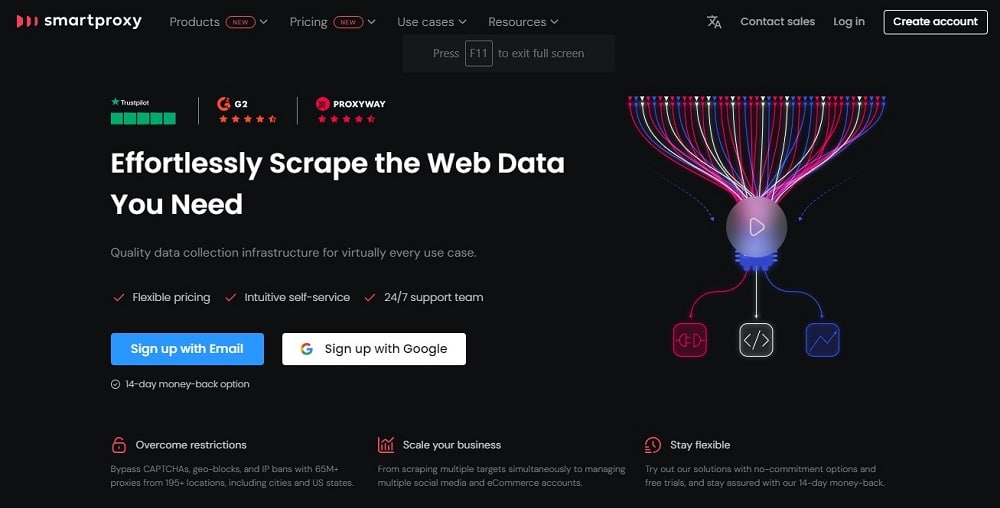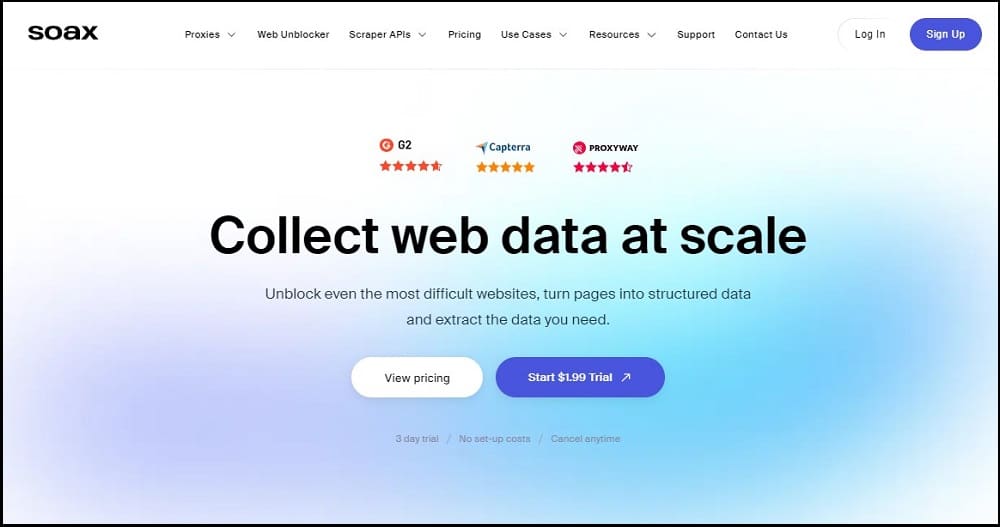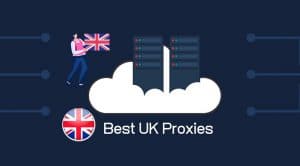Are you looking for an honest review of the Geonode residential proxy service? Then you are on the right page as this page will provide you information about all associated with Geonode.
Geonode makes a big state which is “lowest price guaranteed” on their page. And a look at their pricing reveals so for some of their products. But should you buy from them just because of their cheap pricing? Well, I will advise you not to do so, until you are done reading this Geonode review.
In this review, I will reveal all you need to know about Geonode and its proxy offering, especially its residential proxies. One of the major focuses of the review is to reveal the actual performance of their proxies so you can tell whether it will work for your use case or not.
The Geonode service has been around for less than 3 years. It first made its debut in the market as an unlimited residential proxy provider that is developer-focused. Since then, it has grown to add more products and refine its operations.
Geonode is based in Singapore and has captured a segment of the market of small proxy users, especially those looking for cheap proxies to use. However, it still has a good number of big proxy users in its network considering its large proxy pool size which is considered a plus.
| Parameters | Features |
| IP Type | Residential/Datacenter IPs |
| Priced Charged | Bandwidth |
| Price Sample | $4 per GB |
| Proxy Protocol | HTTP(S)/ SOCKS5 |
| IP Rotation |
|
| Filtering/Targeting | Countries and Cities |
| Authentication | Username/password + IP authentication |
| Speed | Average |
| IP Locations | Over 160 countries |
| Free Trial | No |
| Refund Policy | No |
| Support | |
| Jurisdiction Location | Singapore |
Proxy Types
As stated earlier, the Geonode service offers more than just unlimited residential proxies. In this section of the article, I will give an overview of these proxies and their offering after which we move to feature and then go to performance review.
Unlimited Residential Proxies
Geonode’s unlimited residential proxies are their most popular product — and they have proven to solve an inherent problem — the problem of the cost of residential proxies quickly jacking up your cos,t, especially for tasks that consume a lot of bandwidth. With this, you enjoy unlimited bandwidth for a $99 flat rate.
However, the network is guaranteed to be far for the first 50GB after which the speed you enjoy will be slower for the month. So in essence, you can say their unlimited residential proxies are priced based on speed. And so far, it is the only provider that offers this kind in the market.
You have access to millions of IP addresses from over 160 counties you can use the geo-targeting feature. Even for this, there is the option for both rotating and sticky proxies — and you can also customize the IP rotation time. You are given full control of your experience in this speed-based residential proxy with unlimited data access. From the pricing, you can tell this is not for small proxy users but for those who consume a lot of data, and as such, $99 is a good price to pay for unlimited data access. If you don’t pay close to this for your metered residential proxies, there is no other reason to go with this as it won’t be a cost-effective solution for you.
Pay-As-You-Go Residential Proxies
The naming can be confusing, but they are nothing but your regular residential proxies. The type comes with limited bandwidth and the pricing is based on bandwidth consumption. One thing you will come to like about this is the number of IPs at your disposal — over 30 million residential IPs. With this, you have better control over IP rotation and session management.
It is also a good one for rotating IPs for you. But the interesting thing about this that sets it apart from other providers is that you only pay for successful requests. Aside from its country-level targeting that gives you the option to choose from over 160 countries to get IPs from, there is also support for city-level targeting for selected cities.
In terms of pricing, it has the cheapest price per GB ($4) compared to every other provider on our watch list. And the good thing is, that there is no minimum monetary commitment which goes well with its pay-as-you-go naming.
I recommend this for web scrapers looking for high-rotating proxies to power their bot. It is also a good proxy network for automation bots also. For now, I am putting them forth for small to mid-scale projects as their speed is just average. For larger projects that want fast speed, it is not the best for you.
Mixed Unlimited
For their mixed unlimited proxies, they have both residential and datacenter IPs in the same pool and you get access to it for just $49 monthly without speed throttling. There a situations where using a mix of residential and datacenter proxies works especially for sites that allow the use of datacenter proxies.
Most of the sites on the Internet excluding the popular ones do allow them. However, using too many of them can become a red flag. Using a mix of both datacenter proxies and residential proxies, you are able to hide your footprint and remain in the crowd.
Since speed and bandwidth are not throttle here, what then is throttle? For this, it is the number of concurrent requests that can be sent. Their mix of unlimited residential proxies works great for web scraping and you can throttle the number of concurrent threads to get what you want to meet your scraping needs.
Shared Datacenter Proxies
If you know your target site does not block datacenter IPs from their system, then you can scrape it using this with no hassle and at a very cheap price. This plan gives you access to a pool of 45K datacenter IPs. As the name implies, you will be sharing this with other users of the network too.
However, IPs are rotated frequently enough to avoid getting blocked. The network is more stable than their residential proxies as they have better control over the IPs than residential proxies where they get the IPs via P2P.
The pricing starts from $1 per GB. This is quite cheap and a lot of web scrapers will benefit from its usage as not all sites we scrape have an effective system to detect and block proxies. If that kind of site is your target, then these shared datacenter proxies are a good option for you.
Residential Proxy Features
The Geonode service does have some features that entice users to it. Let's take a look at some of the key ones among them that actually make a difference.
Single Pricing Plan
What we are conversant with are providers that will offer you multiple packages and plans, with the high plans having more enticing features that will want you to spend more money to pay for them. In the case of Geonode unlimited residential proxies and unlimited mix proxies, it is not like that. For the unlimited residential proxies, there is only one plan and it is unlimited for a month and that is the $99 plan. For their mixed unlimited proxies, the price is $49.
This sets it apart from competitors and heavy proxy users will benefit from this kind of pricing. However, for small proxy users, you will end up spending more money than you should as you don’t need to pay their stated amount before you get your task done.
Cheap Pay-A-You-Go Plan

Metered residential proxies have become cheap and most providers have moved from providing highly expensive packaged plans to offering pay-as-you-go pricing. And this includes top-tier providers like Bright Data, Oxylabs, and Smartproxy. Geonode is another provider that follows this route. But does it better as it does not even have packaged plans — you only pay for what you use and pricing is charged only for successful requests.
But this is not the only thing that is interesting about Geonode metered residential proxy pricing. Another good thing about it is that it is the cheapest out there as starts from $4 per GB which is considered one of the cheapest.
Sizable IP Pool and Good Location Coverage
One of the areas you will say Geonode stands tall is in its pool size and location coverage. According to the information on its website, it has over 30 million IP addresses in its pool. This put it in the league of some of the top-tier providers in the market.
My only problem with this is that it does not translate to the level of IP uniqueness offered by the top-tier providers during IP rotation. I said this because the IP duplication rate of Geonode is a little off compared to the top provider — more about this in the performance section.
In terms of location coverage, there are over 160 countries you can get IP addresses from. And for some countries, there is support for city-level targeting. Using this option, you can scrape geo-targeted content and unblock geo-restrictions.
Support Rotating and Sticky IPs
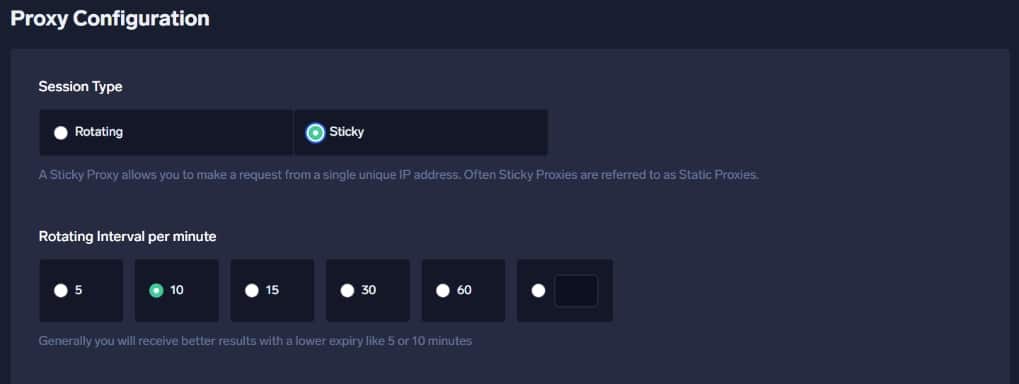
If you go for their residential proxies, you have, for yourself, a proxy network that supports both rotating and sticky IPs. For their rotating proxies, it is assumed you get a new IP address after every request — it does not change this much in reality as a good percentage of their request still assign you an already assigned IP.
However, it does not do that enough to lead to a block in most cases so you are safe. For their sticky IPs, you get an IP assigned to you for a period of time before changing. The default is 10 minutes. However, there is an option for adjustment and configuration as you can choose between 5, 10, 15, 30, and 60 minutes. There is also the option to choose a custom timing but it has to be between 5 – 60 minutes.
Developer Friendly
Geonode has been designed to be developer-focused and friendly. Aside from providing a developer API that developers can use to integrate and access via a RESTFUL API, this service also provides a code generator.
With a code generator, you get code for proxy usage generated for you so you can start using it instantly without going through integration headaches. Currently, it supports a good number of programming languages including Python, Java, PHP, NodeJS, C#, Go, Java, and even Perl.
Residential Proxy Performance
With the above, you should already have an overview of the service. But how does it actually perform? Is it a slow provider or it is fast? What is the success rate like? I will discuss all of that in this section of the review.
Proxy IP Geo Test
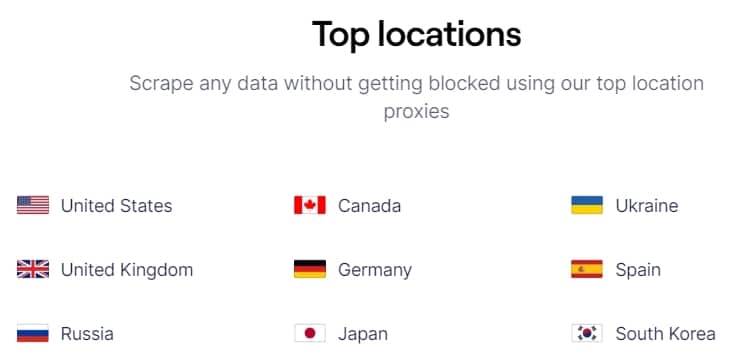
Geonode claims to have over 30 million IPs. While this number is a big one for a small provider of its kind, one other thing that is important is its geo-location distribution. From the information on its website, it supports over 160 countries from across the globe and you can even choose the specific state and city you want IPs from in selected countries. However, what the service didn’t tell us is the number of IPs it has in each country.
This is not something most providers do but those with large pools will tell you the number of IPs they have in their top supported locations.
That information wasn’t provided and this led me to a conclusion — Geonode is not proud of how distributed its IPs are location-wise. If the numbers were impressive, they would show it off. While I can’t vouch for most countries, I can say they have a good number of IPs in reasonable numbers from the United States, UK, Russia, Ukraine, Canada, Germany, Japan, Spain, and South Korea. For the other countries, geo-location targeting won’t be efficient for tasks that require IP rotation.
Proxy Success Rate Test
From the Geonode website, you will see that they claim to give you a 99.99% success rate. Well, from experience, this is more like a marketing gimmick done by every other provider. The reality is always different.
We tested this to ascertain the actual success rate for web scraping, and the average success rate obtained was 77% by sending 300 concurrent requests multiple times to our targets. Below is a graph that shows the success rate on the targets we tested their proxies against.
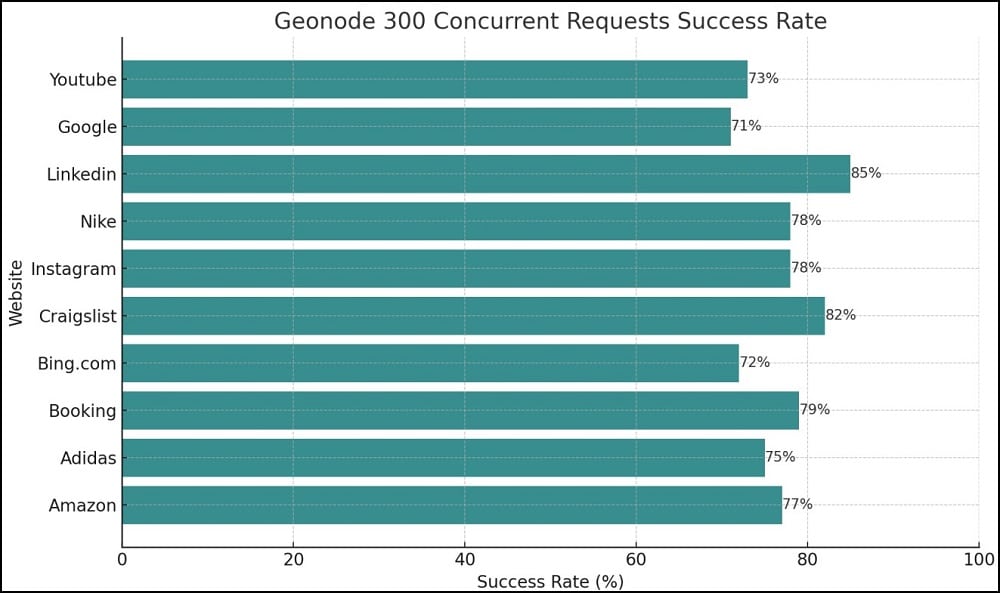
Average success rate: 77%
As you can see above, the highest success rate is for LinkedIn, Craigslist, Booking, Nike, and Instagram. It performs worse on Google, Bing, and YouTube. You can tell here that Geonode does better at scraping e-commerce platforms and even social media platforms than at scraping search engines, considering its worse performance is for Google, Bing, and YouTube. On a general note, the performance is average and can’t be said to be a bad one. However, it is not one of the best in this regard.
Response Time Test
The response time of residential proxies is usually not fast — but going way above 1 – 2 seconds is bad. But where does Geonode stand? I tested the performance of Geonode proxies in terms of response time and paired it with the results of other providers. This will help you visualize how fast their proxies are compared to other providers and will also make it easier for you to make a choice. Below is the graph showing the response time of Geonode together with other providers.
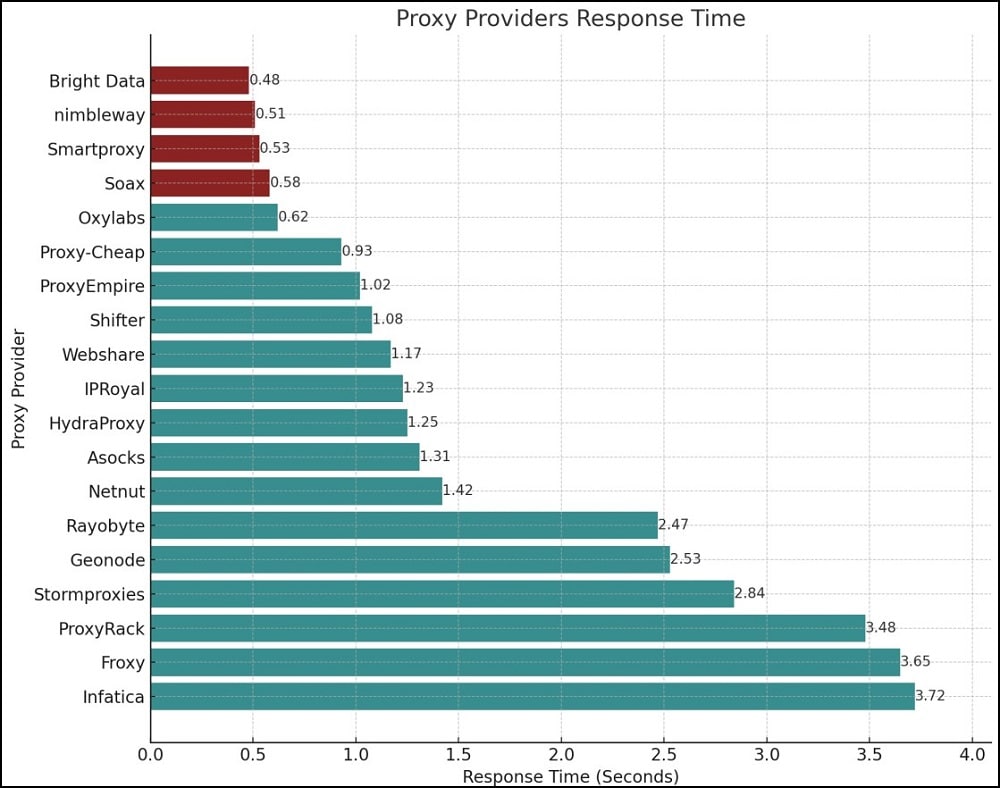
As you can see above, the Geonode response time is 2.53 seconds. This put it among some of the slowest providers, including Froxy, Infatica, Storm Proxies, Rayobyte, and Netnut, among others. Bright Data is the fastest in this regard, as its response time is 0.48 seconds, followed by Nimbleway (0.51 seconds), Smartproxy (0.53 seconds), and then Soax (0.62 seconds).
From this, you can tell Geonode is not the option if what you need are fast proxies, as you will have to wait an average of 2.53 seconds for each request you send. For large projects, this can amount to a long waiting time altogether.
Unique IP Test
Unique IP tests reveal the parentage of duplicate IPs if you were to use their rotating proxies. The result is especially helpful for web scrapers that need to get as many unique IPs as possible. To test for this, I sent over 500K requests to each of my targets, including Geonode. The goal is to see how many of the IPs assigned will be unique. And I did that without using any geo-targeting option or filter that would mess with the result. Below is the result of the set carried out.
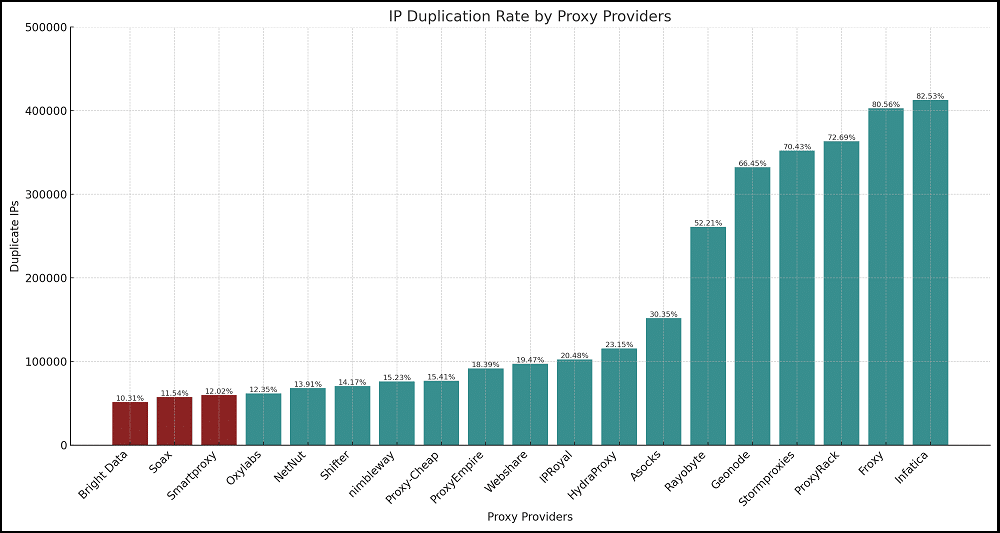
From the above, the IP duplicate rate for Geonode is 66.45%. This number if you ask me, is not completely bad and not good either. At this percentage, you can be sure you won’t get blocked in most cases. However, you aren’t getting as many unique IPs as you will want. If you want unique IPs, then your surest bet is Bright Data, as it has only a 10.31% IP duplicate rate.
How to Use Geonode
How do one use Geonode residential proxies and how easy to use are they? The Geonode residential proxies are not different from the regular proxies you know. The most important things are the proxy details which include the proxy address, port, username, and password.
In the user dashboard of this service, the password is known as an API Key and needs to be generated. When generated, you can then use it alongside the other proxy details. The use of a username and password for authentication is not compulsory.
Geonode supports IP authentication, and you can whitelist up to 50 IPs, which is quite generous compared to what other providers offer. If you need to use the geo-targeting feature or configure session management, then you actually need to do that from the dashboard before copying your proxy details, as that is baked into the proxy details. As a reminder, only use the geo-targeting feature when required, as using it shrinks the number of IPs available to you.
Customer Support
Customer support can improve your satisfaction or frustrate you especially if you have the need to use one. As with other providers, the Geonode service has customer support systems on the ground — but I will term them discriminatory and not given high priority. As a non-registered user of their service, you will need to fill out a long form to get support.
Look at the list of details required. Just doesn’t make sense to me. There is no live chat support system and as such, customer support is via email. You will have to wait for hours to get a response from them. For me, I had to wait for 3 hours to be responded to.
This is not a good user experience, as other providers have live chat support. As a registered user, you don’t have to fill out a form as long as the above. However, support is via ticket, and you will still have to wait to get a response after some hours, too.
Source of IPs
Genode has over 30 million IP addresses and we are sure 99.99% are not owned by them. They are owned by regular users who may or may not have consented to their device IP and bandwidth being used. Unlike a few providers that are open with the source of their IPs, Geonode is not — you are only told the IPs are ethically sourced.
The consent hidden in a large chunk of terms and conditions isn’t an ethical way of seeking consent since 99.99% of users don’t read that. I wouldn’t say their source of IPs is illegal, but there is not enough evidence also to show they are an ethical provider.
Do We Recommend Geonode
The Geonode service has over 30 million IP addresses in its pool. While this is a good thing in theory, in practice, Geonode has one of the worst performances in terms of IP duplicate rate in the market. For this reason, I will place it on the list of residential proxies for small proxy users.
The unlimited nature of their proxies is a plus for those who have tasks that consume a lot of bandwidth. However, this might not be the best for large projects as the performance results are not promising enough for use in large-scale projects.
Alternatives to Geonode
From the above, you can tell Geonode does have a good number of flaws even though it has its strengths too. If the flaws are something you can’t deal with, then you can make a choice from one of the alternatives mentioned below.
Bright Data — Recommended for more powerful session control. Bright Data is our recommended residential proxy provider. It has one of the largest pools and comes first in terms of location coverage, response time, IP unique rate, and success rate. It also gives you more control over your sessions. You can get it to assign you a new IP after every request or maintain a session for your specified period of time (less than one hour, though).
Smartproxy — A good alternative for its fast speed. The Smartproxy service is one of the fastest residential proxies out there. But you will also benefit from its good location support, high success rate, and how effective it is for web scraping and other forms of automation. It also has one of the cost-to-quality ratios in the market.
Soax — If you want a cleaner pool with a high success rate, then Soax is the alternative here. The pool is constantly monitored with the bad IPs removed. This together with its large pool size and some in-house mechanisms keeps the success rate or web scraping high for this service. However, you will need a minimum of $99 to get started with this service.
Our Expert's Review
-
Scaping Performance - 7.9/10
7.9/10
-
Proxy Network - 8/10
8/10
-
Proxy Functions - 8/10
8/10
-
Customer support - 6.9/10
6.9/10
Read other user reviews

